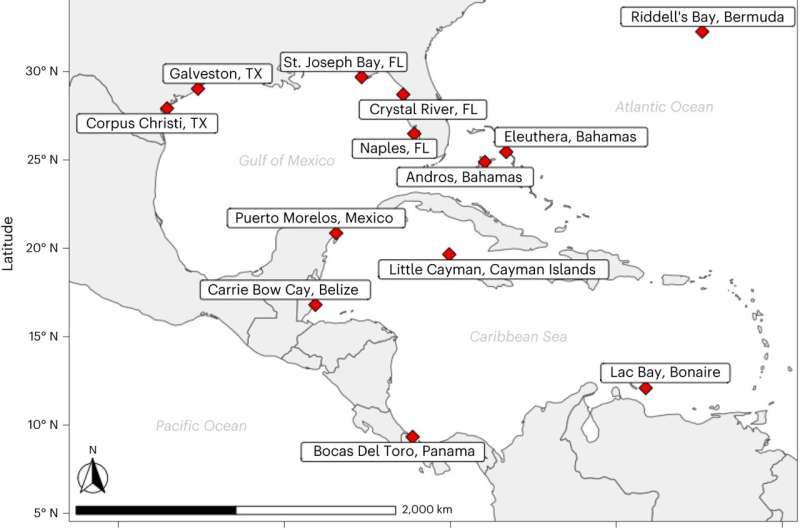This article has been reviewed according to Science X's editorial process and policies. Editors have highlighted the following attributes while ensuring the content's credibility:
fact-checked
trusted source
proofread
Hungry turtles jeopardize seagrass meadows

There's a hidden threat looming among subtropical seagrass meadows—turtles in search of milder temperatures.
It's not just turtles, though. Manatees and a host of other herbivores that feed on a steady diet of seagrass, seagrass and more seagrass need lots of it to survive. In addition to a steady supply of food, these herbivores also generally like to reside in warm climates. And as ocean waters warm, many herbivores are expanding their ranges and heading poleward, occupying waters that were previously too cold.
That may be bad news for subtropical regions that normally do not support many herbivores. As it turns out, many subtropical seagrasses are not nearly as resilient as their tropical counterparts, according to new research published this month in Nature Ecology & Evolution.
"This is a story about herbivores on the move because of climate change and the impact they might have on subtropical seagrasses," said Justin Campbell, lead author and FIU marine biologist. "What this study shows is seagrasses in some regions may be unable to tolerate more herbivores moving in as they expand with warming temperatures."
The study focuses on turtlegrass—a foundational seagrass distributed across the Caribbean and Gulf of Mexico—and examines its response to simulated feedings across a range of latitudes. The findings reveal a troubling trend: Because subtropical seagrass meadows receive less sunlight relative to their tropical counterparts, they do not grow back as quickly when they are grazed upon. If tropical herbivores expand into subtropical waters, the threat of overgrazing may be very real.
"If we want to give these meadows the best chance of enduring the anticipated increases in grazing, we need to get them as much light as possible. That means protecting the water quality," Campbell said.
Overgrazing is not yet a widespread occurrence across the Western Atlantic, but Campbell said it's already happening in subtropical to temperate waters surrounding Australia and in the Mediterranean. While the findings were not a surprise to the team of scientists, they represent the profound impacts climate change can have to throw underwater ecosystems completely off balance.
"Seagrass ecosystems are already subject to multiple stressors," Campbell said. "To maintain balance in our oceans, this is just more evidence that we need to prioritize protecting our water quality and implementing effective management strategies to address the mounting threats brought on by climate change."
While subtropical seagrasses have been found to be less resilient than their tropical counterparts, scientists have also discovered an interesting indicator of resilience—carbs. Seagrasses that are packing in carbohydrates exhibited a greater ability to grow and thrive even as they are devoured by herbivores. Seagrasses without large amounts of carbs lacked the energy to regrow quickly. Maybe carbs aren't so bad after all.
More information: Justin E. Campbell et al, Herbivore effects increase with latitude across the extent of a foundational seagrass, Nature Ecology & Evolution (2024). DOI: 10.1038/s41559-024-02336-5
Provided by Florida International University


















